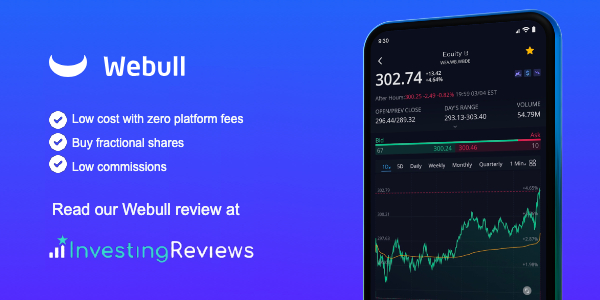
Welcome to The C-Suite, a monthly interview with leading executives in the retail trading industry.
This month we’re joined by Nick Saunders, CEO of Webull UK. Nick started his career at IG Group and spent time at a couple of other providers, most notably Trading 212, where he was CEO of the group’s UK division.
Why did you agree to join Webull?
I was working with some great people at Stonex, so it was not an easy decision to make. In the couple of years before I joined, I had a few offers, but either I didn’t feel the culture was right, or the role was right for someone with a sales background. I’m definitely not a salesman.
I was aware of Webull doing well in the US, and when I spoke to Anthony Denier and the Group Directors, I liked how they were approaching international expansion. The plans were ambitious, but I felt realistic in terms of the time it takes to get a business off the ground and to become profitable. From a personal point of view, I have always enjoyed the international aspect of the business and am lucky to have had the opportunity to work across Europe and Asia. Diversity helps you challenge your own view of how things should be done. At Webull, we might come across a problem in the UK that our team in Hong Kong have a solution for. We are given the freedom to take the parts of it that work for our local market and adapt it.
Your career mirrors a change we’ve seen in the UK retail market over the past 5 years or so, where providers have moved from being solely in the CFD space to providing cash equities and exchange-traded derivatives. Has it been easy to make that change on a personal level or have you had to change your skill set a bit?
I would hate to think that I ever stop learning. I came into the industry with a degree in Medieval Languages and a year’s experience as a timber importer (Siberia in January is bracing).
Learning how the financial markets worked was all new, but we had to learn how all the products worked – shares, futures, metals and forex. So I think I already had a good grasp of how the equities market worked -but you’re right to think that there is a definite change of mindset. For CFD shops there can be an adversarial nature to client relationships. On a personal level you may want a client to do well, but you know that if all clients make money the firm won’t. The cash equities business is largely agency based – it’s about providing the right tools and products to help clients.
More broadly, do you think providers will struggle to make this change, given how different the products can be?
It’s definitely hard, and on top of the mindset change requires a lot of technical and human resource. Trading is probably the easier part, but the processes required to support the product are complex – settlement, corporate actions, prospectus requirements. With thin margins it’s not a change that everyone is going to be in a position to make even if the strategic will is there.
What plans does Webull have for the UK in terms of products?
In the short term we want to increase the number of exchanges to which our clients have access. As well as UK and European stocks, we want to make use of our Group entities in APAC and North America to open up more markets. Options are high on the list of our priorities and possibly more investment focused products.
You’ve launched as a group in several regions now. If I think of the UK alone, you have lots of nuances. For example, SIPPs, ISAs, GBP accounts. Is it hard to cater to nuances like that when you are part of a larger group that’s not based here?
Part of building a successful brokerage is to localise the offering properly. I think this is something we achieve at Webull where the local management takes ownership of the product. I was really pleased when I started to find that the development team had done some detailed research into the UK market and knew what ISAs, RSPs and SIPPs were. I wouldn’t claim that all the text on website or in our education materials is perfect, but, to take an example for a competitor’s website that I saw today, I would hope that we aren’t referring to ACH fees or SIPC protection. Webull benefits from the fact that its management is international rather than being laded with monocultural assumptions about how the markets should work.
Do you plan on expanding your team here? What areas would that be in if so? Eg. engineering, marketing, compliance
Definitely. As we grow both in client numbers and in product set we will need to hire. In the short term this is likely to be in operations – finance and customer support are the two keenest areas. We’re lucky that we can draw on significant resource globally to help, but we need to be self-supporting in the UK.

Options are one of the key products Webull offers. I’m curious if you have an idea of how much demand you see for them in the UK? Most people here seem to trade OTC, do you foresee a change there?
I know that you’ve previously written a couple of times about Webull being an options broker, but we don’t currently offer them in the UK. Like you, I was rather skeptical about the demand for them in the UK (despite having worked on the options desk at IG early in my career) – the leverage market is dominated by CFDs.
I have absolutely changed my mind about this though – and we intend to broaden our product range. Since opening we’ve received a number of client comments asking why we don’t offer them. To some extent, this is because they have seen our US offering and have been disappointed it has not been replicated in the UK, but I do not think this is the whole story. Webull Australia has seen phenomenal interest in options, and I think the demographics and competitive products there are analogous to the UK. So yes, I am convinced there is demand and that this demand for a product where the pricing is complex, is best served on an agency basis.
Another key product is stocks trading. How do you plan on making this model work in the UK given its commission-free and PFOF is banned?
We’re not going to commission free. I don’t think this is supportable without PFOF unless there are other charges somewhere. We will be charging a really, really low commission, but one that will help us cover costs. Beyond that we will make some money on FX conversions netting off buys and sells, and potentially look to lend stock out.
Yes – since PFOF is banned, we have a different business model than our sister brokerages. We are charging users low commission to ensure compliance with local regulations. However, clients of our US entity don’t pay commission because the US broker received PFOF, so there is a clear difference.
Robinhood say they’re launching in the UK by EOY. You have CMC, IG and maybe eToro/Plus500 about to offer options trading here too. You have wider competition with smaller providers. How do you succeed in this kind of hypercompetitive market?
We know that we have a competitive product – we are competing successfully in the US against Robinhood and have made strong inroads against local competitors elsewhere. We have a solid, sustainable business model and a roadmap to increase our product set. The final arbiter will be the market – will clients like what we have enough? Our experience elsewhere suggests they will.
Do you plan on offering CFDs?
We don’t plan to offer CFDs in the short term. We like to ensure that our interests are aligned with those of our customers and coupled with our minimal appetite for proprietary risk, there is little chance of Webull becoming a CFD firm. We do want to offer our clients as many trading products as possible, so where it is appropriate we may distribute someone else’s CFDs to our clients either through a white label or a direct referral. I don’t see this happening for some time though.
It looks to me like some US providers may end up acquiring other firms. Is that something Webull would consider doing?
It’s fairly likely that we will make an acquisition at some point, but this is not likely to be acquiring another broker in the UK. London is a vibrant fintech hub, and if the opportunity arises to buy a product we could roll out to our global client base we would definitely be interested.


